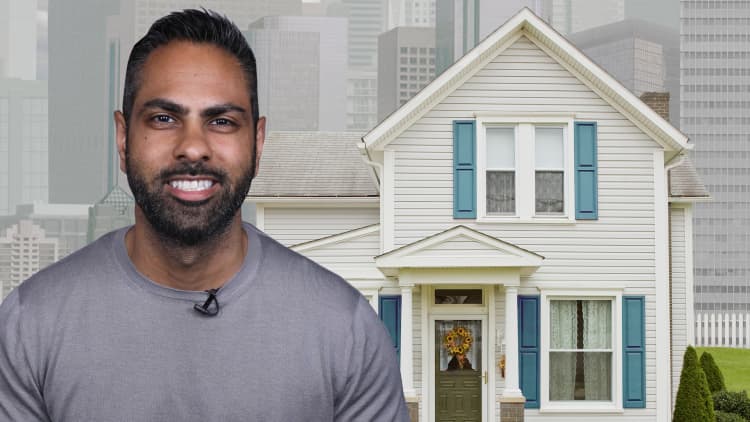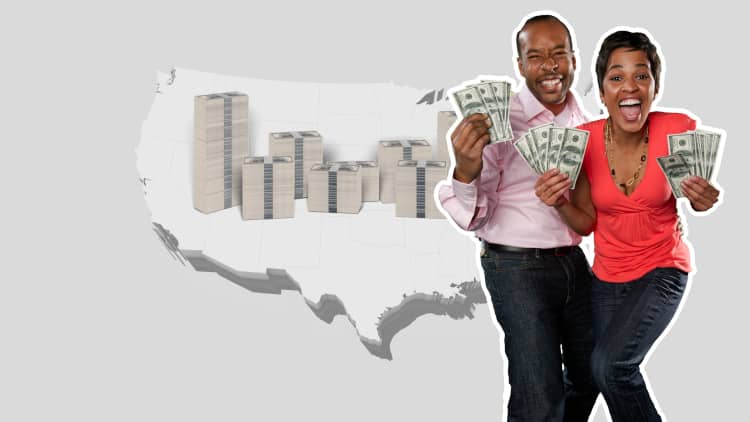In the U.S., home prices are continually on the rise, and as a result, 60% of millennial homeowners say housing costs make it difficult to achieve their financial goals. Specifically, nearly half (42%) worry about whether they'll be able to save enough to pay for their children's college tuition.
That's according to research from home equity site Hometap. In its 2019 Homeownership Study, Hometap surveyed 675 homeowners, including 241 millennials, in order to take a closer look at how high housing costs impact U.S. homeowners. Of those surveyed, 73% reported feeling "house rich, cash poor" at least some of the time.
It's unsurprising that millennial homeowners are beginning to stress over saving for their kids' college fees. For many millennials, paying their kids' tuition is a major priority. In fact, 59% of well-off millennials say they'd delay saving for retirement in order to cover their children's higher education. But the high costs of homeownership aren't making this goal any easier.
Rising home prices are undeniable: In 1940, the median home value in the U.S. was $2,938. By 2000, it had risen to $119,600 and today it's just over $230,000. When adjusted for inflation, the median home price in 1940 would still only have been $30,600 if calculated using 2000 dollars.
At the same time as housing costs are creeping upward, so too, is college tuition. During the 1988 to 1989 school year, students attending public four-year institutions paid an average of $3,360 with prices adjusted to reflect 2018 dollars, according to the College Board's "Trends in College Pricing 2018" report. Now, 30 years later, the average has risen to $10,600 for the 2018 to 2019 school year.
Plus, in the U.S., wages for U.S. workers have barely increased over the last 40 years. When you couple that with the fact that many millennials still have their own student debt to pay off, it's no wonder they're feeling stressed over the impact expensive mortgage payments could have on their other long-term financial goals.
That's why, if buying a home is on your list of goals, it helps to make it as affordable as possible. In other words, try to control the controllable. Factors such as where you live or how you choose to go about acquiring a home can help mitigate costs.
Here are four tips for buying a home without blowing your budget.
1. Consider the location
When deciding where to settle down, it's important to consider your annual salary and whether it will be enough to sustain your lifestyle in certain cities.
The median income for middle-class U.S. households was $78,442 as of 2016, according to a 2018 report from the Pew Research Center. However, in some major metropolitan areas, such as New York and San Francisco, raising a family can require hundreds of thousands of dollars per year.
But it's possible to afford a big city if you're willing forgo living downtown. Cheaper housing is often found just outside of major metropolitan areas, and those who dwell in suburbs often save almost four times as much as those living in cities, according to a survey from Credit Karma.
When trying to save money on a home, it's also smart to consider buying a smaller house (if it suits your family's size) or choose a more affordable city.
2. Run the numbers first
Millennials are waiting longer to buy homes, which may be a good thing if they aren't yet financially prepared for homeownership. The last thing you want to do is take on a financial burden you're not able to keep up with.
When purchasing a home, experts recommend saving up 20% of the home's sticker price for a down payment. But there are other costs involved as well, including closing costs, which are typically 2.5% of the total cost of the home, moving expenses and ongoing mortgage payments. And you'll want factor in any extra cash you'll potentially need for repairs and maintenance.
After adding all this up, you'll start to see how much you actually need to afford to buy. While this can be intimidating, it can also serve as a helpful reality check. Should you find that you aren't yet financially ready to buy, it's okay to wait. It's better to hold off and keep saving than buy a home that will end up putting you underwater financially.
3. Keep an eye on the market
It's always a good idea to keep an eye on when the market turns favorable for buyers. In a buyers' market, there are typically a lot of homes for sale and not a lot of other interested buyers. When this happens, it drives down home prices and leaves you more room to negotiate a good deal.

You can often tell what kind of market you're in by observing the real estate conditions in the area you're looking to buy. Check websites, such as listing site Zillow, to see how many homes are for sale, how often recent home prices are being cut and how long homes are sitting on the market. If there's a high volume of for-sale homes, frequent pricing cuts and a large number of home sitting unsold for long periods of time, you're likely in the midst of a buyers' market.
4. Get the best rate you can
Since buying a home is a big purchase, the interest rate on your mortgage loan will significantly impact how much you end up spending. Although these rates are largely based on the basic rules of supply and demand, there are strategic measures you can take to try and get the lowest one possible.
Start by shopping around to see which lenders and banks offer the best rates. A simple way to make these comparisons is by using an online mortgage rate comparison tool, such as the one offered by financial services site Bankrate. There, you can review a variety of lenders with differing rates and product options.
Your financial health also matters. If your credit score is "good" or higher, lenders will take that into account and it could result in lower interest. That's because a higher credit score shows lenders you're responsible with your money and gives them confidence that you'll be able to repay your loan.
In the end, if your rate is lowered, it could end up saving you hundreds per month on mortgage payments.
Don't miss:
- Here's how many Americans don't have access to a 401(k) plan
- You need to earn $418,000 to buy a home in NYC—here's what you need in other major US cities
- A simple equation will show you if you're on track to save enough for retirement
Like this story? Like CNBC Make It on Facebook!



